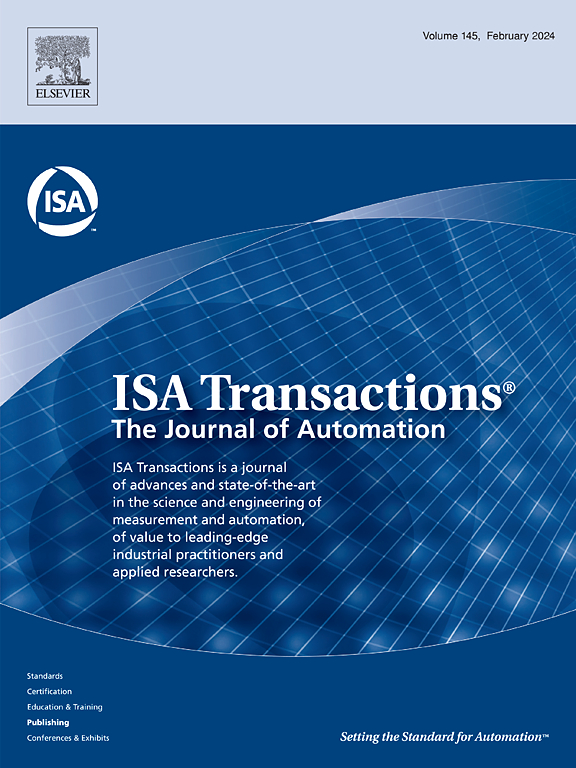针对不稳定延时过程的设定点加权 PI-FOPD 级联控制器合成,满足预先规定的安全裕度。
IF 6.3
2区 计算机科学
Q1 AUTOMATION & CONTROL SYSTEMS
引用次数: 0
摘要
本文介绍了一种新的带预滤波器的设定值加权PI-FOPD (SWPI-FOPD)级联控制器。它进一步描述了一个四阶段设计策略,该策略依次增强跟踪响应,减少超调,并确保不稳定时滞(UTD)过程的鲁棒性。该控制器适用于任意阶的积分和非积分UTD过程,不需要模型阶数缩减或延迟逼近。该策略包括四个阶段,每个阶段针对性能改进的一个特定方面。第一阶段设计最优鲁棒FOPD (ORFOPD)控制器以加速跟踪响应。在第二阶段,级联最优鲁棒PI (ORPI)控制器确保稳态误差为零。增益和相位裕度(GPM)测试仪确定KP1-KD1和KP2-KI2平面上可行的规范导向区域(FSORs),帮助选择ORFOPD和ORPI控制器,以在± 10%环路增益扰动(LGPs)下最小化IAE或ISE指数。第三阶段安排设定值加权系数,以减少通常与UTD过程相关的超调。最后阶段使用预滤波器来细化参考输入信号并减轻超调。总结了一个系统的设计过程,以快速计算所有控制器增益的一步一步的顺序。这种带有预滤波器的SWPI-FOPD控制器增强了鲁棒性,提供了零稳态误差的快速跟踪响应,即使在± 10% LGPs的情况下,也能有效地减少超调和IAE或ISE。通过三个实例的对比仿真,以及一个实际的夹套CSTR应用,验证了该控制器的可行性并展示了其优越的性能。本文章由计算机程序翻译,如有差异,请以英文原文为准。
Setpoint weighted PI-FOPD cascade controllers synthesis for unstable time-delayed processes satisfying prespecified safety margins
This article introduces a novel setpoint weighted PI-FOPD (SWPI-FOPD) cascade controller with a prefilter. It further describes a four-stage design strategy that sequentially enhances tracking responses, reduces overshoot, and ensures robustness for unstable time-delayed (UTD) processes. The controller applies to integrating and non-integrating UTD processes of any order and does not necessitate model order reduction or delay approximation. The strategy involves four stages, each targeting a specific aspect of performance improvement. The first stage designs the optimal and robust FOPD (ORFOPD) controller to accelerate tracking responses. In the second stage, the cascade optimal and robust PI (ORPI) controller ensures zero steady-state error. A gain and phase margin (GPM) tester determines the feasible specification-oriented regions (FSORs) on the KP1-KD1 and KP2-KI2 planes, aiding in selecting the ORFOPD and ORPI controllers to minimize the IAE or ISE index under ± 10% loop gain perturbations (LGPs). The third stage schedules setpoint weighting coefficients to reduce overshoot typically associated with UTD processes. The final stage uses a prefilter to refine the reference input signal and mitigate overshoot. A systematic design procedure is summarized to rapidly compute all controller gains in a step-by-step sequence. This SWPI-FOPD controller with a prefilter enhances robustness, provides rapid tracking response with zero steady-state error, and effectively reduces overshoot and IAE or ISE, even with ± 10% LGPs. Comparative simulations across three examples, along with a practical jacketed CSTR application, validate the feasibility and demonstrate the superior performance of the proposed controller.
求助全文
通过发布文献求助,成功后即可免费获取论文全文。
去求助
来源期刊

ISA transactions
工程技术-工程:综合
CiteScore
11.70
自引率
12.30%
发文量
824
审稿时长
4.4 months
期刊介绍:
ISA Transactions serves as a platform for showcasing advancements in measurement and automation, catering to both industrial practitioners and applied researchers. It covers a wide array of topics within measurement, including sensors, signal processing, data analysis, and fault detection, supported by techniques such as artificial intelligence and communication systems. Automation topics encompass control strategies, modelling, system reliability, and maintenance, alongside optimization and human-machine interaction. The journal targets research and development professionals in control systems, process instrumentation, and automation from academia and industry.
 求助内容:
求助内容: 应助结果提醒方式:
应助结果提醒方式:


